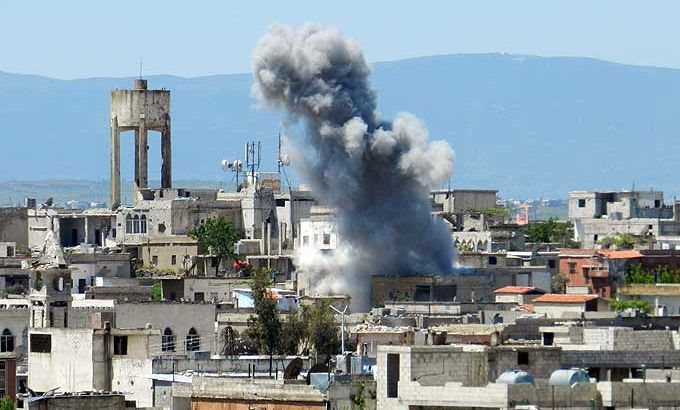Syrian chemical weapons debate intensifies
UN commission says it has no “conclusive findings” of use, as US says it believes use by Assad forces “highly likely”.

A UN team of investigators has said it has not reached “conclusive findings” that chemical weapons have been used by any parties in the Syrian conflict, distancing itself from an earlier statement from one of its members that suggested the likely use of sarin gas by rebels.
The UN Commission of Inquiry on Syria said in a statement on Monday that it “wishes to clarify that it has not reached conclusive findings as to the use of chemical weapons in Syria by any parties to the conflict”.
The opposition Syrian National Coalition(SNC), which will hold a symposium on chemical weapons in Istanbul on Tuesday, has said only the regime had such capabilities.
On Monday, Carla Del Ponte, a member of the UN commission, said that “according to the testimonies we have gathered, the rebels have used chemical weapons, making use of sarin gas”.
She acknowledged that there was “still not irrefutable proof, [but] very strong suspicions, concrete suspicions that sarin gas has been used… by opponents, by rebels, not by government authorities”.
US stance
Later on Monday, the White House and the State Department said that it was likely that President Bashar al-Assad’s regime, not the rebel opposition, was behind any chemical weapons use in Syria.
“We are highly sceptical of suggestions that the opposition could have or did use chemical weapons,” said White House spokesman Jay Carney.
“We find it highly likely that any chemical weapon use that has taken place in Syria was done by the Assad regime.”
On Tuesday, US Secretary of State John Kerry arrived in Russia to meet President Vladimir Putin and discuss, among other issues, the situation in Syria.
Al Jazeera’s David Chater, reporting from Moscow, said: “Russia has always stood by the Assads; they have links of 40 years going back.
“Not only are there Russian boots on the ground in Syria, there is business, fuel and defence hardware. It’s unlikely we’ll find any movement in the political position.”
There is “remote hope that Russia will change its stance on the Assad regime,” he added. “With evidence being collected on sarin gas, the only way out of this [for Russia] is [engaging in] peace negotiation.”
Opposition refutes
The Free Syrian Army (FSA) swiftly denied Del Ponte’s statement that rebel forces had likely used chemical arms.
Speaking to Al Jazeera on Monday, Salim Idris, FSA chief of staff, said the remarks were a “huge injustice” and “provocation” to the Syrian people.
The Syrian regime and rebels have both accused each other of using chemical weapons, which are banned under international law.
In a statement on Monday, the SNC said: “The Coalition condemns all use of chemical weapons, whoever uses them and it will pursue its investigation and collect evidence on this issue to present to the international commission of inquiry.
“If the inquiry proves that any party other than the Syrian regime has used chemical weapons, the coalition will take all legal and appropriate measures whoever the party is and whatever the reason or motive for the usage might be.”
The Geneva-based inquiry into war crimes and other human rights violations is separate from an investigation of the alleged use of chemical weapons instigated by UN Secretary-General Ban Ki-moon.
Ban’s office is still trying to negotiate entry into Syria to investigate and collect samples.
Set up two years ago at the behest of the UN Human Rights Council, the commission has also been unable to gain access to Syria as Damascus ignores repeated requests for entry.
Instead, it has interviewed more than 1,500 refugees and exiles as a basis for its reports and its charges that both the government forces and their allies and opposition forces have carried out war crimes.
Sarin is a powerful neurotoxin developed by Nazi scientists in the 1930s.
Originally developed as a pesticide, sarin was used to deadly effect in air raids in 1988 by Saddam Hussein’s forces on the Kurdish village of Halabja in northern Iraq that left an estimated 5,000 people dead.